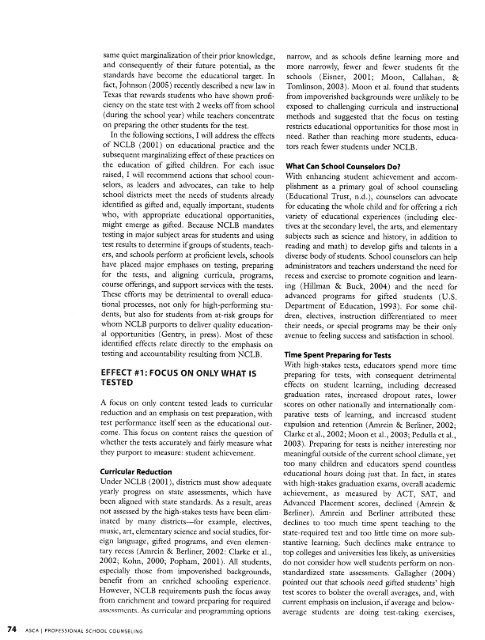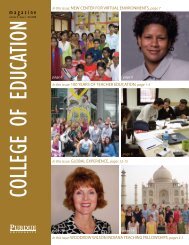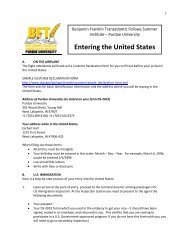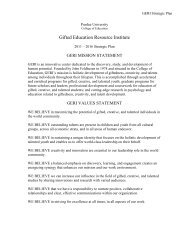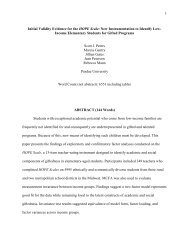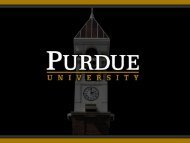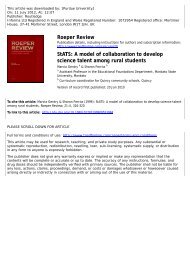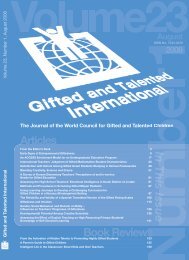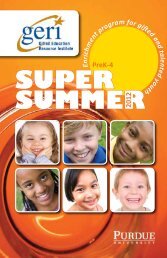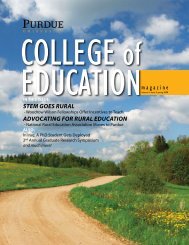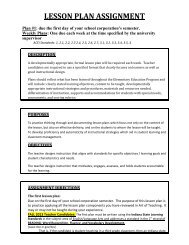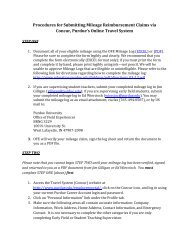No child left behind: Gifted children and school counselors.
No child left behind: Gifted children and school counselors.
No child left behind: Gifted children and school counselors.
Create successful ePaper yourself
Turn your PDF publications into a flip-book with our unique Google optimized e-Paper software.
same quiet marginalization of their prior knowledge,<strong>and</strong> consequently of their future potential, as thest<strong>and</strong>ards have become the educational target. Infact, Johnson (2005) recently described a new law inTexas that rewards students who have shown proficiencyon the state test with 2 weeks off from <strong>school</strong>(during the <strong>school</strong> year) while teachers concentrateon preparing the other students for the test.In the following sections, I will address the effectsof NCLB (2001) on educational practice <strong>and</strong> thesubsequent marginalizing effect of these practices onthe education of gifted <strong>child</strong>ren. For each issueraised, I will recommend actions that <strong>school</strong> <strong>counselors</strong>,as leaders <strong>and</strong> advocates, can take to help<strong>school</strong> districts meet the needs of students alreadyidentified as gifted <strong>and</strong>, equally important, studentswho, with appropriate educational opportunities,might emerge as gifted. Because NCLB m<strong>and</strong>atestesting in major subject areas for students <strong>and</strong> usingtest results to determine if groups of students, teachers,<strong>and</strong> <strong>school</strong>s perform at proficient levels, <strong>school</strong>shave placed major emphases on testing, preparingfor the tests, <strong>and</strong> aligning curricula, programs,course offerings, <strong>and</strong> support services with the tests.These efforts may be detrimental to overall educationalprocesses, not only for high-performing students,but also for students from at-risk groups forwhom NCLB purports to deliver quality educationalopportunities (Gentry, in press). Most of theseidentified effects relate directly to the emphasis ontesting <strong>and</strong> accountability resulting from NCLB.EFFECT #1: FOCUS ON ONLY WHAT ISTESTEDA focus on only content tested leads to curricularreduction <strong>and</strong> an emphasis on test preparation, withtest performance itself seen as the educational outcome.This focus on content raises the question ofwhether the tests accurately <strong>and</strong> fairly measure whatthey purport to measure: student achievement.Curricular ReductionUnder NCLB (2001), districts must show adequateyearly progress on state assessments, which havebeen aligned with state st<strong>and</strong>ards. As a result, areasnot assessed by the high-stakes tests have been eliminatedby many districts-for example, electives,music, art, elementary science <strong>and</strong> social studies, foreignlanguage, gifted programs, <strong>and</strong> even elementaryrecess (Amrein & Berliner, 2002: Clarke et al.,2002; Kohn, 2000; Popham, 2001). All students,especially those from impoverished backgrounds,benefit from an enriched <strong>school</strong>ing experience.However, NCLB requirements push the focus awayfrom enrichment <strong>and</strong> toward preparing for requiredassessments. As curricular <strong>and</strong> programming optionsnarrow, <strong>and</strong> as <strong>school</strong>s define learning more <strong>and</strong>more narrowly, fewer <strong>and</strong> fewer students fit the<strong>school</strong>s (Eisner, 2001; Moon, Callahan, &Tomlinson, 2003). Moon et al. found that studentsfrom impoverished backgrounds were unlikely to beexposed to challenging curricula <strong>and</strong> instructionalmethods <strong>and</strong> suggested that the focus on testingrestricts educational opportunities for those most inneed. Rather than reaching more students, educatorsreach fewer students under NCLB.What Can School Counselors Do?With enhancing student achievement <strong>and</strong> accomplishmentas a primary goal of <strong>school</strong> counseling(Educational Trust, n.d.), <strong>counselors</strong> can advocatefor educating the whole <strong>child</strong> <strong>and</strong> for offering a richvariety of educational experiences (including electivesat the secondary level, the arts, <strong>and</strong> elementarysubjects such as science <strong>and</strong> history, in addition toreading <strong>and</strong> math) to develop gifts <strong>and</strong> talents in adiverse body of students. School <strong>counselors</strong> can helpadministrators <strong>and</strong> teachers underst<strong>and</strong> the need forrecess <strong>and</strong> exercise to promote cognition <strong>and</strong> learning(Hillman & Buck, 2004) <strong>and</strong> the need foradvanced programs for gifted students (U.S.Department of Education, 1993). For some <strong>child</strong>ren,electives, instruction differentiated to meettheir needs, or special programs may be their onlyavenue to feeling success <strong>and</strong> satisfaction in <strong>school</strong>.Time Spent Preparing for TestsWith high-stakes tests, educators spend more timepreparing for tests, with consequent detrimentaleffects on student learning, including decreasedgraduation rates, increased dropout rates, lowerscores on other nationally <strong>and</strong> internationally comparativetests of learning, <strong>and</strong> increased studentexpulsion <strong>and</strong> retention (Amrein & Berliner, 2002;Clarke et al., 2002; Moon et al., 2003; Pedulla et al.,2003). Preparing for tests is neither interesting normeaningful outside of the current <strong>school</strong> climate, yettoo many <strong>child</strong>ren <strong>and</strong> educators spend countlesseducational hours doing just that. In fact, in stateswith high-stakes graduation exams, overall academicachievement, as measured by ACT, SAT, <strong>and</strong>Advanced Placement scores, declined (Amrein &Berliner). Amrein <strong>and</strong> Berliner attributed thesedeclines to too much time spent teaching to thestate-required test <strong>and</strong> too little time on more substantivelearning. Such declines make entrance totop colleges <strong>and</strong> universities less likely, as universitiesdo not consider how well students perform on nonst<strong>and</strong>ardizedstate assessments. Gallagher (2004)pointed out that <strong>school</strong>s need gifted students' hightest scores to bolster the overall averages, <strong>and</strong>, withcurrent emphasis on inclusion, if average <strong>and</strong> belowaveragestudents are doing test-taking exercises,74 A5CA I PROFESSIONAL SCHOOL COUNSELING


